
by Fiona Biedermann (Australia) | Dec 16, 2013 | 2013, Being Thankful, Childhood, Domesticity, Grandparent, Kids, Life Balance, Life Lesson, Me-Time, Oceania, Older Children, Parenting, Pregnancy, Siblings, Sleep, Sleep and Children, Womanhood, Working Mother, World Motherhood
 Twenty five years ago today I became a mother for the first time. In some ways it feels like a lifetime ago and in some ways it feels like only yesterday that I was gazing at the face of my oldest son, in both awestruck wonder and sheer terror.
Twenty five years ago today I became a mother for the first time. In some ways it feels like a lifetime ago and in some ways it feels like only yesterday that I was gazing at the face of my oldest son, in both awestruck wonder and sheer terror.
I was seventeen years old and I thought I knew it all, as only a teenager can believe. How wrong I was.
Motherhood is the biggest learning curve any woman can embark on and there is no right or wrong. If you love your child, can keep him safe from any major harm and bring him up to be a halfway decent human being, than I think you’re doing alright.
Then again, sometimes all the right parental steps in the world can’t prevent what life throws at us or what our children become.
The thing is, in my case, if I were to do the motherhood thing over again, I’m not sure that there’s a whole lot I would do differently. Although given a chance, I probably wouldn’t be quite so hard on myself and I’d probably take a little bit more time out for me.
As a young mother I felt like I was constantly having to prove myself, I had to try just a little bit harder, put in a just a little bit more effort, complain a little bit less – basically just suck it up and get on with the job of being a mum to prove everyone wrong.
I was my own toughest critic and at times I could beat myself up better than anyone else about how I was failing as a mother.
The truth is, I wasn’t failing as a mother, and I never did. One of my son’s girlfriends once told me how terrified she was that she wouldn’t be a good mum. I told her the very fact that she was worried that she wouldn’t be meant that she would be fine.
As a mother, you do the best you can with what you have.
I believe that no-one can say what is right or wrong about motherhood. Breast fed baby or bottle fed baby, working mum versus stay-at-home-mum. How we raise our children is our choice and that is what contributes to a world full of people with different personalities, who have a multitude of experiences and knowledge to add to the great big melting pot of people.
Yes I’m feeling slightly nostalgic as we celebrate my oldest baby’s birthday today. I consider many of my friends who now have young children and I wonder whether it would have been wiser (like them) to wait until we were better off financially and more established in our careers and life experience.
When our friends were marching up the career ladder, partying hard and taking overseas holidays; hubby and I were having sleepless nights and staying at home making our own fun and eating home cooked meals.
Then I consider the fact that my children didn’t want for the important things, they had food in their bellies, a roof over their heads and a wealth of love and good times. Yes we struggled financially and stress kept me awake on many long nights. My kids might not have had expensive toys and name brand clothes, but they grew up loving the outdoors and learning to make their own fun.
The best things in life definitely were free – money can’t buy things like imagination, sunshine, nature and water.
Now at the age of 42, I’m ready to start living my life. In the last few years I’ve had to sprint up the career ladder to catch up with others my age and that’s had its own set of challenges as well. The good thing is, my youngest baby is now 16 and I’m still youthful enough to enjoy my life and all the challenges which lie ahead.
Besides when I get nostalgic for babies, I now have my grandchildren to love and adore and the energy to still enjoy them – not to mention the added benefit of being able to hand them back.
The reality is, if I had my time to do over again, I wouldn’t change a thing.
What about you, are there things even now, which you know you would do differently?
This is an original World Moms Blog post by Inspiration to Dream of Adelaide, South Australia. Fiona is the writer of Inspiration to Dream and can be found writing or reading in every spare moment that isn’t filled up with work and her three boys, and of course with a bit of spare time thrown in for hubby as well.
Image credit to Cliparto This image has been used within the terms of use from Cliparto

Fiona at Inspiration to Dream is a married mother of three amazing and talented MM’s (mere males, as she lovingly calls them) aged 13, 16 and 22, and she became a nana in 2011!
She believes she’s more daunted by becoming a nana than she was about becoming a mother! This Aussie mother figures she will also be a relatively young nana and she’s not sure that she’s really ready for it yet, but then she asks, are we ever really ready for it? Motherhood or Nanahood. (Not really sure that’s a word, but she says it works for her.)
Fiona likes to think of herself as honest and forthright and is generally not afraid to speak her mind, which she says sometimes gets her into trouble, but hey, it makes life interesting. She’s hoping to share with you her trials of being a working mother to three adventurous boys, the wife of a Mr Fix-it who is definitely a man’s man and not one of the ‘sensitive new age guy’ generation, as well as, providing her thoughts and views on making her way in the world.
Since discovering that she’s the first blogger joining the team from Australia, she also plans to provide a little insight into the ‘Aussie’ life, as well. Additionally, Fiona can be found on her personal blog at Inspiration to Dream.
More Posts

by Sophie Walker (UK) | Dec 11, 2013 | 2013, Autism, Being Thankful, Childhood, Divorce, Education, Friendship, Girls, Inspirational, Kids, Life Balance, Life Lesson, Me-Time, Older Children, Parenting, Relationships, Running, School, Sophie Walker, Special Needs, Stress, UK, Womanhood, Working Mother, World Motherhood, Writing
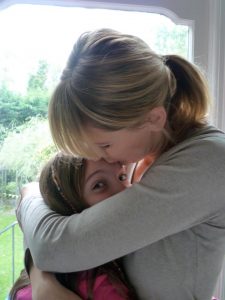 When I was a little girl, I wanted to be a writer.
When I was a little girl, I wanted to be a writer.
My bookshelves were bursting with myths and legends, tales of epic journeys and magical enchantments and warriors and warlocks and princesses; talking animals and terrifying villains. I read many of them over and over and would always think, when I closed the covers, how wonderful the author must have felt to have created such a thing.
I started writing my own stories, on sheets of rough paper, taped or stapled together. I would write the title first, then the author – me – beneath, then carefully index the chapters, number the pages and sometimes, if feeling really enthusiastic about the content, provide rave reviews for the back. I showed my parents, my friends, my teachers. People nodded and smiled.
I grew up, and kept writing. I studied English and French literature, and kept writing. I studied journalism, and kept writing. I got a proper job, and kept writing. Then I had a daughter, and stopped for a while. When I came back to it, I wrote furiously for several months, then realised the embarrassingly semi-autobiographical nature of the novel I had crafted, and put it aside. I got married, and got divorced, and had another child, and got married again.
There wasn’t very much time for writing, let alone for cudgeling my exhausted brain into thinking of something interesting to say.
Then my elder daughter Grace was diagnosed with Asperger’s Syndrome. It had taken us years to find out what it was that was ‘off’ – what the teachers saw, and wondered about, and what her peers saw, and walked away from, and what I saw, and thought was just my eccentrically lovable child. Finding out that my daughter had autism was like discovering she had been living behind glass for 8 years and that I had been oblivious to the sound of her banging her fists on it.
We were sent off with a label, and little support. Grace started to be bullied at school as she grew older and her differences became more apparent and other children were drawn to her weirdness and capacity for combustion when they pressed her buttons. They found all her buttons.
Grace spent a lot of time crying. I spent a lot of time crying. We both felt very alone.
Then one day on the way to work, I pulled out my notebook and emptied the thoughts in my head onto the pale blue lines. I scribbled and scribbled, oblivious to the other commuters, thinking that if I wrote everything down then I might be able to make sense of it. I came home and said to Grace: “Shall we write about what’s happening to us?” And Grace said: “Yes. Please tell them what it’s like.”
So I wrote. I wrote a blog and called it Grace Under Pressure. I wrote about how it feels to be the parent of a child with autism. I wrote about the things I was learning and about how much I realised I still had to learn. I wrote about Grace’s marathon attempts to fit in and understand her own limitations and learn to cope with the limitations of classmates who had no sympathy or understanding. I wrote about running a marathon myself in order to raise awareness among those who had no sympathy or understanding of autism.
People started reading the blog. Then more people read it, and more. Eventually, someone said: “You know, you should really think about making this into a book.” A publisher called Little, Brown agreed.
My book is not the book I ever thought I would write. But it is the kind of book that I used to read. It is the tale of an epic journey, and a magical enchantment, and a courageous princess. I am very proud of the princess, and I am grateful to her every day for letting me tell her story and for taking me with her on the adventure that changed our lives.
Grace Under Pressure: A Girl with Asperger’s and her Marathon Mom, by Sophie Walker, is published in the United States by New World Library, and in the UK by Little, Brown (Piatkus).
**Enter to win a free copy of Grace Under Pressure! Comment on this post for a chance to win — we will be choosing a winner on Friday, December 13th! **
This is an original post by our writer in the UK, Sophie Walker.
The image in this post is credited to the author.

Writer, mother, runner: Sophie works for an international news agency and has written about economics, politics, trade, war, diplomacy and finance from datelines as diverse as Paris, Washington, Hong Kong, Kabul, Baghdad and Islamabad. She now lives in London with her husband, two daughters and two step-sons.
Sophie's elder daughter Grace was diagnosed with Asperger Syndrome several years ago. Grace is a bright, artistic girl who nonetheless struggles to fit into a world she often finds hard to understand. Sophie and Grace have come across great kindness but more often been shocked by how little people know and understand about autism and by how difficult it is to get Grace the help she needs.
Sophie writes about Grace’s daily challenges, and those of the grueling training regimes she sets herself to run long-distance events in order to raise awareness and funds for Britain’s National Autistic Society so that Grace and children like her can blossom. Her book "Grace Under Pressure: Going The Distance as an Asperger's Mum" was published by Little, Brown (Piatkus) in 2012. Her blog is called Grace Under Pressure.
More Posts

by Katinka | Dec 5, 2013 | 2013, Adoption, Adoptive Parents, Being Thankful, Belgium, Childhood, Cultural Differences, Culture, Education, Eye on Culture, Family, International, Kids, Life Lesson, Motherhood, Multicultural, Netherlands, Parenting, Penguin and Panther, Politics, Siblings, Traditions, Turkey, United Nations, World Events, World Motherhood, Younger Children
 As an adoptive mother of an Ethiopian Panther, I’ve grown an extra pair of antennas when it comes to racism.
As an adoptive mother of an Ethiopian Panther, I’ve grown an extra pair of antennas when it comes to racism.
Truly, a lot of really nice people distinguish my daughter from other children, based on her color. Even if it is meant to defend her, like calling me disgusting for letting her carry the groceries, it basically still is hidden racism. Should I tell her that people believe she shouldn’t be helping me out because it reminds them of slavery while her white brother is allowed to do the same chores? I’d rather have people call me names than let them wreck my daughter’s self esteem.
However, as I’m writing this, there is a HUGE racism debate going on in Belgium and even worse in The Netherlands, where it all started. And despite my racism antennas, I just can’t fully agree with the racism-yellers this time. Not even if they yell all the way from some United Nations office.
The debate is all about the ancestor of Santa Claus: Sinterklaas. You can read here about how Santa Claus evolved from our Sinterklaas, or Saint Nicholas, who is actually believed to be Turkish, who resides in Spain, has a white horse called Bad-Wheater-Today (Belgium) or Amerigo (The Netherlands), and celebrates his December birthday by coming over to our countries and surprising children with presents.
In the Netherlands he comes over on the evening of December 5th. Later that night, he comes to Belgium and delivers toys and sweets to be found in the children’s shoes on the morning of the 6th. It’s really a children’s celebration, full of magic and anticipation. You will bump into him just about everywhere during November.
Now, because Sinterklaas is getting old and forgetful, and has a lot of work to do within 24 hours, he has helpers. These helpers are all black, and hence all called ‘Black Peter’ (Zwarte Piet).
And that’s where all the accusative fingers point.
Indeed, this tradition can be seen as offensive. I, for a fact, believe it is partly based on a slavery and stereotype-loaded past, and a lot of people agree with me. Black Peter has long been depicted as a bit slow, barbaric (kidnapping and hitting the naughty children), dressed in clownish clothes, with stout lips and being submissive to his white boss.
Of course I agree this is an awful, insulting picture to brainwash our children with during the big Sinterklaas-Awaiting-Month-of -November. I also agree an outsider would be shocked, when he meets Sinterklaas and his Black Peters for the first time, especially if oblivious to the folklore. And I honestly understand and feel the offense people take.
For me personally, Sinterklaas has me cringing with bittersweetness ever since I found out about his racist taint. I’m not even particularly fond of the Sinterklaas tradition anymore.
However, I also don’t agree that we are teaching our children racism, nor paying ode to slavery by honoring this tradition every year. Not any more, that is.
Since the 1990’s, we have a children’s holiday special on TV portraying the real story. Children are elegantly taught Black Peter is black – and not brown/colored/african – because he came down the chimney. No more, no less. Nobody really tries to explain why his clothes didn’t get black during his journey down the chimney.
It is just part of the mystery, just like Bad-Wheater-Today walking on rooftops or Sinterklaas having this enormous book in which the good and bad behavior of every single child is listed. It doesn’t make sense, but children buy it anyway.
In this TV-special, Sinterklaas is depicted as a bit senile. In fact his Black Peters are now the smart ones, all with different names according to their function or character. A bit like the Smurfs, and everyone likes the Smurfs, right?
For the past 20+ years, this special comes on every November. Along the way, children started to grow more afraid of this very strict and grumpy old man than of his joyous, candy throwing helpers. The Black Peters became the true friends of our children. And every Belgian child you ask about Black Peter’s color now, will patiently tell you the chimney-story.
To me, this shows our tradition is evolving from, I admit, a racist past, towards a new story. Just like it evolved into Santa Claus overseas—who, by the way, appears to imprison a whole lot of innocent, little people in a Siberia-like, harsh environment without paying them for their round-the-clock labor.
Therefore, I trust society may even evolve towards a tradition of White Peters in a few more years or decades. After all, with more and more houses being built without huge chimneys, we will sooner or later find out that Peter’s color is fading, won’t we?
I’m hoping that by the time this post runs, all the petitions –pro and con–the social media frenzy, any UN investigations and any public manifestations, will be over and done with. I truly hope no-one got hurt along the way, and that both camps have reached a certain level of understanding towards each other by the time Saint Nicholas wants to celebrate his birthday.
Because, you know, my children are already expecting Sinterklaas to send one of his Peters down our chimney on the 6th of December. Especially my very dark daughter is impatiently awaiting. I’d hate to disappoint her if he decided not to come this year, because he’s afraid to be called a racist. She would definitely not understand, mainly because she doesn’t see any resemblance between Black Peter and herself.
I’m confident Sinterklaas will make it, though. We are both alike, Sinterklaas and me. We’re already used to people calling us racist slave handlers. And we both know better than that.
Did you know about Santa Claus’s European past? How would you feel if he had black helpers instead of elves?
This is an original post to World Moms Blog by K10K from The Penguin and The Panther.
The picture in this post is credited to Sinterklaas Himself, who published it on Wikipedia, while undercover as Gaby Kooiman, under GNU Free Documentation License.
If you ask her about her daytime job, Katinka will tell you all about the challenge of studying the fate of radioactive substances in the deep subsurface. Her most demanding and rewarding job however is raising four kids together with five other parents, each with their own quirks, wishes and (dis)abilities. As parenting and especially co-parenting involves a lot of letting go, she finds herself singing the theme song to Frozen over and over again, even when the kids are not even there...
More Posts

by Susie Newday (Israel) | Nov 28, 2013 | 2013, Being Thankful, Family, Israel, Multicultural, Religion, Spirituality, Susie Newday, Traditions, World Moms Blog, World Motherhood
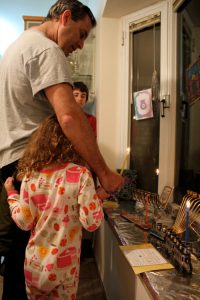 This year, we have a unique occurrence, Thanksgivvukah. (Yes, I know that by now the phrase is probably coming out of your ears.) There are debates as to whether Thanksgivukkah is a once in a 70,000 year event or a once in a decade event. Either way, the last time it happened was 1888 and I doubt any of us will be around for the next one.
This year, we have a unique occurrence, Thanksgivvukah. (Yes, I know that by now the phrase is probably coming out of your ears.) There are debates as to whether Thanksgivukkah is a once in a 70,000 year event or a once in a decade event. Either way, the last time it happened was 1888 and I doubt any of us will be around for the next one.
The Jewish month of Kislev, the month in which Chanukkah occurs, is considered a month of miracles. It’s a month that serves as a reminder to actively do something to banish the darkness from our lives and be a light unto others and the world.
Last night was the first night of the 8 day Jewish holiday of Chanukkah and tonight is the American holiday of Thanksgiving.
I’m grateful for the unique convergence of the two holidays because I think that the message of Chanukah and Thanksgiving is really the same; practice gratitude, practice kindness and be the love you wish to receive. That is the only way to banish the darkness from this world and spread the glow of goodness to the farthest corners of the earth.
So in honor of Thanksgivukkah here are some ideas for making the world a better place.
Embrace the Thanksgiving tradition of practicing gratitude, but go one step further and practice it daily. Be grateful for all the gifts in your life be they big or small.
Embrace the Chanukkah tradition of spreading your light, your inner light, far and wide. I think that the best way to combine gratitude and being a light unto the world is to get into the habit of doing acts of kindness.
So here are ideas for 8 acts of kindness for 8 days of Chanukah, or for that matter, any day of the year.
Smile at everyone you pass
A smile costs you absolutely nothing and you never know what a potentially big impact a single smile can have on someone else’s day.
Write a letter to someone who has made a difference in your life
People don’t always realize the impact they have had on someone. Why not let them know?
Give someone a big hug
People need physical contact and hugs make (most) people feel good.
Forgive someone
This is actually kindness that benefits you the most because forgiving is really for the forgiver.
Ask if you can help
Some people don’t know how to ask for help or don’t think there is anyone who can help them. It can be as simple as asking a parent with a screaming child in a grocery store if they need help or lending your expertise to someone who can benefit from it.
Offer to babysit for someone
Every parent knows that as much as we love our kids, sometimes we need some time apart. Give the gift of sanity to another parent.
Leave a note in a library book
A little note of kindness and encouragement left inside a library book can make all the difference to a struggling parent. Take a look at this amazing note my sister found tucked into the pages of a parenting book.
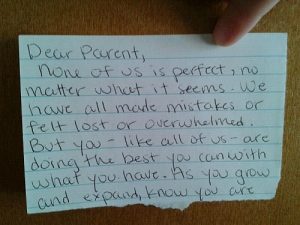
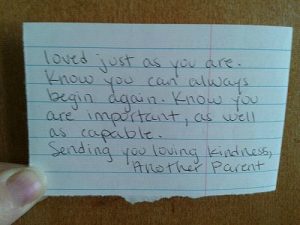
Listen, truly listen
Each and every one of us can learn how to listen better. Listen without thinking about what you are going to reply. Listen with an open mind and most importantly, an open heart. As Buddha said: “A thousand candles can be lit from the flame of one candle, and the life of the candle will not be shortened. Happiness can be spread without diminishing that of yourself.”
So Happy Chanukkah and Thanksgiving to everyone. This holiday season go out and be the light and light the way. Be the person whose act of kindness or love inspires other people to pay it forward and spread kindness and love. One person DOES have an impact, it all starts with the will to make a change.
What is your favorite act of kindness?
This is an original post by World Moms Blog Africa & Middle East Regional Editor, Susie Newday in Israel.
Photo credit to the author. (And to her sister.)
And just for fun, here is a Thanksgivukkah spoof. (If you don’t understand some of the words, they are probably in Hebrew. Just ask me in the comments and I will translate them if you want.)
Susie Newday is a happily-married American-born Israeli mother of five. She is an oncology nurse, blogger and avid amateur photographer.
Most importantly, Susie is a happily married mother of five amazing kids from age 8-24 and soon to be a mother in law. (Which also makes her a chef, maid, tutor, chauffeur, launderer...) Susie's blog, New Day, New Lesson, is her attempt to help others and herself view the lessons life hands all of us in a positive light. She will also be the first to admit that blogging is great free therapy as well. Susie's hope for the world? Increasing kindness, tolerance and love.
You can also follow her Facebook page New Day, New Lesson where she posts her unique photos with quotes as well as gift ideas.
More Posts - Website
Follow Me:






by Tinne from Tantrums and Tomatoes | Nov 11, 2013 | 2013, Being Thankful, Belgium, Childhood, Competition, Contest, Education, Family, Girls, Husband, Life Lesson, Parenting, Relationships, Siblings, Tantrum and Tomatoes, World Motherhood, Younger Children
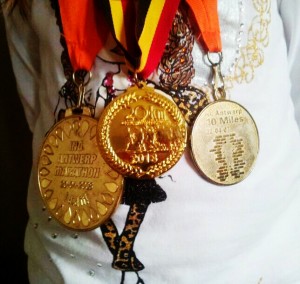 There is no denying that my eldest child is competitive.
There is no denying that my eldest child is competitive.
Fiercely competitive.
The kind which makes for a future Olympic-Gold-Medal winner – competitive.
She needs to be first. Perhaps it has something to do with the fact that she is the oldest, but I suspect it is just part of her genetic make up.
Her father has the same drive to always do better than the rest, to drive himself towards new goals, to be better, faster, to force his body into running a marathon and to try to improve his time again and again and again. And he is willing to suffer for it, to endure muscle cramps, to run until his energy levels have been completely depleted and he is more dead than alive.
I’m not like that, neither is n°2. We are happily just pottering about, going about our business and we will get there in the end. So what if it takes us hours, weeks or months. So what if we don’t finish first. We ran, didn’t we? We did our part. Besides I do not like discomfort, mentally or physically.
Like so many characteristics, my daughter’s competitiveness is a two sided sword.
It is what drove her to learn how to ride a bike without training wheels in just two days, simply because a boy in her class could do it and if that boy could do it then there was no reason why she shouldn’t be able to as well.
It got her out of diapers so quickly simply because her friend was also potty training and she wanted to be first.
But there is a downside as well. Being only four, she aims to be first in just about everything she does. And I really do mean e-ve-ry-thing . Whether it is rolling in the dust, dressing herself, putting olives on a pizza, eating said pizza, learning how to count to 20, spelling out her own name AND that of mommy, to her it is a competition. She will try to ‘win’ at it, do a victory dance when she ‘wins’ and be inconsolable when she doesn’t.
There have been many conversations about how winning is nice but not so important that you need to bawl your eyes out when some other kid takes the prize and that she cannot always be first. That is OK not to always win, not to be top in everything and that there are some things, that I’m sorry my dear darling, you will not be able to do.
This – I have to admit – will be a though lesson for her to learn. And she will have to learn it, otherwise she’ll be a pill-popping, nervous wreck by the time she is 16.
And she will have to find a way to turn that competitiveness into something positive.
But there is the glitch in the whole affair. How will she learn?
Through experience? Will it just click one day? Will she simply just realize that she is not musical (she has inherited my signing voice, which sounds like a chorus of warthogs high on helium), that she cannot really jump that high. Will she be sad, will she cry, will she regret it her whole life or… will she just simply accept. Accept that yes, she sucks at music, dancing, mathematics, but hey, she has a knack for drawing awesome portraits and makes a killer brownie, so what the heck …
How did you or your child come to terms with the fact that there is something that you or s/he just is not good at?
This is an original post to World Moms Blog from our mother of two in Belgium, Tantrums and Tomatoes.
Born in Belgium on the fourth of July in a time before the invention of the smart phone Tinne is a working mother of two adorably mischievous little girls, the wife of her high school sweetheart and the owner of a black cat called Atilla.
Since she likes to cook her blog is mainly devoted to food and because she is Belgian she has an absurd sense of humour and is frequently snarky. When she is not devoting all her attention to the internet, she likes to read, write and eat chocolate. Her greatest nemesis is laundry.
More Posts - Website
Follow Me:



by Karyn Wills | Nov 4, 2013 | Being Thankful, Brothers, Childhood, Family, Family Travel, Friendship, Home, Inspirational, Kids, New Zealand, Older Children, Parenting, Relationships, Siblings, Traditions, Travel, Uncategorized, Vacationing, World Motherhood, Younger Children
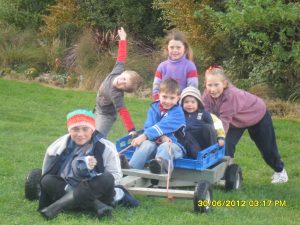 I have three sons and they are a lot of fun. They are also a lot of noise, mess and busyness.
I have three sons and they are a lot of fun. They are also a lot of noise, mess and busyness.
They adore one another most of the time and loathe one another at other times. Needless to say, living in a small house can get a little hectic and the fact that we live a car trip away from most of the boys’ friends—and I don’t always want to drive to fetch or deliver children—means that, from time to time, my boys can have a little too much of one another.
We are one small family and that can make us all tiresome to one another – no matter how strong the love between us.
The healthiness of living in an isolated, nuclear family unit has always bothered me a little. Not that living with my extended family or my in-laws would suit me, or them I suspect, either. But the cousins. Oh my goodness. The wonder of having cousins around – that appeals to me.
With cousins there is the common bond of grandparents and other family members, and the common history and the common family rituals. There is the emotional connection of knowing they all belong together, and the emotional connection of having been all together for their life times.
But, what I really love is the bond I see between our boys and all of their cousins in terms of visible affection and loyalty. When we have been away on holiday together, older cousins have often taken our boys off for adventures or have played with them, especially as babies and toddlers, so I could have a break. Younger cousins provide opportunities for my older boys to teach and help, in their turn. Sometimes it’s just fun to hang out together.
With their cousins, my boys are learning that things their brothers have said to them repeatedly, and they have ignored, are often the same opinions of others – and their cousins are not afraid to tell them so, sometimes bluntly. They are learning a higher level of co-operative skills and greater negotiation techniques, than they get to use with just two others. They are learning to walk away, when they need to walk away, and they are learning when it is appropriate to comment on another’s behaviour and when it is best to stay silent.
Like their brothers, their cousins love them. Unlike their brothers, their cousins are listened to. Like their friends, their cousins enjoy playing with them and will tell them to go away, when they‘ve had enough – but only for a short while. Unlike their friends, they cannot be transient members of their lives. And that last point, in particular, I love.
Do your children have good relationships with their cousins? Do you see a deeper bond between your children and their cousins, than with their friends?
Karyn is a teacher, writer and solo mother to three sons. She lives in the sunny wine region of Hawke’s Bay, New Zealand in the city of Napier.
More Posts

 Twenty five years ago today I became a mother for the first time. In some ways it feels like a lifetime ago and in some ways it feels like only yesterday that I was gazing at the face of my oldest son, in both awestruck wonder and sheer terror.
Twenty five years ago today I became a mother for the first time. In some ways it feels like a lifetime ago and in some ways it feels like only yesterday that I was gazing at the face of my oldest son, in both awestruck wonder and sheer terror.




















